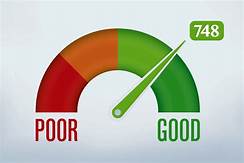-
 Rising Interest Rates: A New Era in Commercial Lending Explore how rising interest rates are reshaping the commercial lending landscape, influencing business borrowing strategies, and highlighting new opportunities.
Rising Interest Rates: A New Era in Commercial Lending Explore how rising interest rates are reshaping the commercial lending landscape, influencing business borrowing strategies, and highlighting new opportunities.

matt
Buying a Mortgage Causes Credit Scores to Dip
- Friday, 02 November 2018

In the aftermath of a mortgage closing, credit scores decline 15 points, though they do recover with time. The drop occurs because after a consumer takes out a mortgage, a large balance is added to his credit report, according to a survey from Lending Tree.
Credit scoring models consider a consumer’s total balance of money owed, and a large increase in outstanding debt drives scores lower. Also, the creation of a new credit line item also weighs on the score, though to a lower extent.
To be sure, a mortgage also increases the diversity of accounts in the credit file, which also boosts the score. As time passes, making on-time payments helps a borrower improve their credit score as they demonstrate they are managing their new mortgage account well. Eventually, the score returns to its pre-mortgage level, and often, surpasses it.
"A house is the biggest purchase most people make in their lifetime, with the accompanying mortgage being their largest financial transaction," said Tendayi Kapfidze, chief economist at LendingTree that. "Most people know they should work toward having the best possible credit score before applying for a mortgage, as an applicant's credit score can significantly affect the amount and cost of borrowing. But what happens to your credit score after you get a mortgage?" wasn’t necessarily clear.
Among the key findings of the report are the following:
- Scores fall for at least four months.On average, credit scores fell by 15 points and took 160 days, or just over five months, to reach their low points. Mortgages do not appear on credit reports immediately after closing. Typically, the mortgage lender starts reporting to the credit bureaus after the first payment and depending on the lender's reporting cycle, so it may take about 60 days after closing or even longer for it show up and start affecting a score. New Orleans homeowners saw their credit scores reach their lowest points in an average time of 133 days, while Milwaukee homebuyers' scores had the longest decline: 191 days.
- Recovery takes at least another five months.It took an average of an additional 161 days for scores to return to their prior levels. As borrowers make on-time payments, their credit scores start to recover. In Richmond, Va., homebuyers' credit scores rebounded fastest at 130 days, while the upward climb for homeowners in Austin, Texas, lasted 197 days.
- Eleven months later, scores recover and are poised to move higher.The average for the complete decline and recovery cycle was 11 months nationally. Richmond homebuyers saw their credit scores go through the cycle the fastest, nine months, while the dip and return of Milwaukee homebuyers' scores took the longest, 13 months.
- Tight range of score declines.The average score fell the most in Virginia Beach, Va., down 20 points, and the least in Minneapolis at just 11 points. Individual credit scores in the sample declined as much as 40 points.
Upstart Upgrade Closes 1st Securitization
- Thursday, 01 November 2018

Upgrade Inc. closed its first securitization of $282 million of personal loans to almost 20 banks and asset managers.
This transaction inaugurates Upgrade's securitization program, designed as a quarterly issuance program. Credit Suisse and Jefferies acted as joint lead underwriters, and Upgrade served as sponsor, servicer and administrator for the transaction. Upgrade has raised $142 million in equity capital and facilitated over $1 billion in loans since launch in April last year.
“Our securitization program is designed to provide liquidity and a lower cost of funds to our loan buyers through a standardized issuance program," said Renaud Laplanche, co-founder and CEO of Upgrade. "We believe this securitization program is the ideal complement to our marketplace approach whereby banks and asset managers can buy consumer loans and personal credit line balances on an on-going basis."
Upgrade is securitizing receivables from its Personal Credit Line product.
Through Credit Line, consumers are approved for up to $50,000 and can request an advance on the line when they need it, subject to credit approval. Borrowers gain the flexibility to access funds when they need them, and the predictability of a fixed rate and equal monthly payments. Credit Lines can be used like a home equity line of credit—though consumers can obtain approval for a Personal Credit Line in a matter of minutes without collateral or an appraisal process.
Similar to an installment loan, each advance has a fixed rate and term, making it easy to budget for monthly payments. There is no fee to open the line and no fee to use the line. Customers are only charged interest on the amount they use, and the funds are deposited directly into their bank account. Payment terms will vary from 12 to 60 months.
Read more...
TML’s Factoid Report: Ellie Mae
- Thursday, 01 November 2018

(ML's Factoid Report condenses some key points from a company's quarterly earnings conference call with analysts.)
A focus of new business for Ellie Mae are some of the largest lenders and correspondent investors, who are now interested in working with the company. “And that is because we have gotten to a place of so much share coming from Encompass lenders that sell to other investors that those investors are now coming to the table and showing genuine interest, serious interest, for Encompass,” said Jonathan Corr, CEO of Ellie Mae, during the company’s third-quarter earnings call.
Corr discounted the possibility of a stock buy-back, saying “We have a stock repurchase out there. And we've used it in the past, but we're also always looking at the best use of cash and that includes (mergers and acquisitions) that we're always considering,” said Corr. “So, it’s something we'll consider, we have a plan out there and we just (have) to balance the best use of proceeds.”
Ellie Mae didn’t experience a significant change in its historical churn rate of 1 to 1.5 percent per quarter, “which is very low, obviously (we have) very high retention rates,” despite the decrease in originations the industry experienced, said Corr.
Contracted revenue increased 25% to $88.6 million and represented 72% of total revenue. Contracted revenue are subscription revenue streams that are fixed by the terms of a contract and professional services revenues, representing 7% of revenue.
Although the volume of originations could drop 5 percent, Ellie’s Corr said increase market share (and earnings) will be realized through lenders that use more products, new clients, and offering additional products. In addition, some clients that were added, haven’t generated volume so far. Big lenders, such as TD Bank, big lenders like PenFed Credit Union are not fully ramped out, and that’s true of other lenders that we've sold. Ellie has a market share of 35 percent. Despite challenges, Ellie Mae’s long-term target growth rate remains at 20%
Read more...





